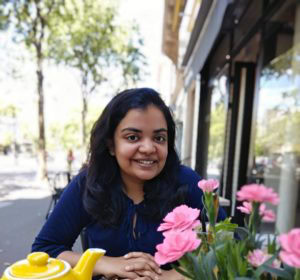Exploring the intersections of science and policy
We’re delighted to share that Kellogg College member Amrita Suresh has been selected as one of just 30 scientists from across the UK to take part in this year’s prestigious Royal Society Pairing Scheme – a unique initiative designed to foster stronger connections between the worlds of science and public policy.
The scheme, which has been running since 2001, pairs researchers with parliamentarians and civil servants for a series of reciprocal visits. The initiative aims to ensure that the best available scientific evidence informs policymaking at every level. 
Amrita, who is based at in the Department of Computer Science, was paired with civil servants from the Department for Science, Innovation and Technology’s Advanced Communications Team. Over the course of four days in Westminster this spring, they explored the role of future telecoms – one of the five critical technologies identified in the UK Government’s 2023 Science and Technology Framework – and how innovation in this field can support the ambition to make the UK a global science and technology superpower by 2030.
Reflecting on the experience, Amrita said:
“As part of the scheme, I engaged in discussions with policymakers and civil servants as we sought to explore challenges for policy, investment, research, the interplay between technical ambition and real-world implementation. I’m incredibly grateful for the opportunity to contribute to these forward-looking conversations and to build connections at the science-policy interface. I’m very much looking forward to welcoming the team to Oxford for a reciprocal visit this June.”
The scheme exemplifies the value of interdisciplinary exchange – bringing scientific insight into the policymaking arena and encouraging researchers to engage with the social and political contexts that shape their work. We are sure that Amrita will continue to enjoy productive conversations with her counterparts on the scheme, and hope that we may all reap the benefits of deeper engagement between research and policy in the years ahead.